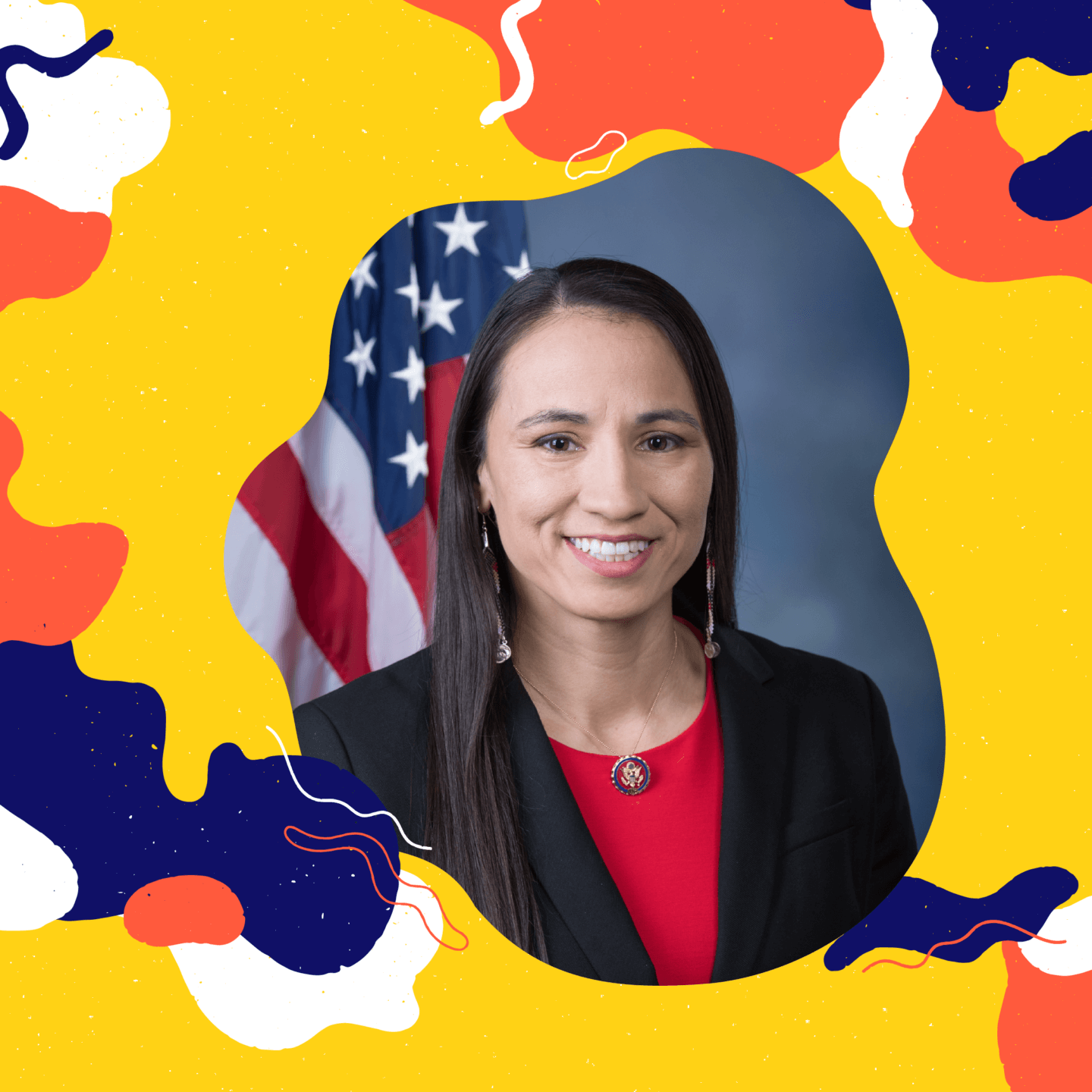Written by Ryan Bernsten (he/him), Senior Managing Editor
Rep. Sharice Davids (she/her) is currently serving Kansas’s 3rd Congressional District in Congress. Sharice was raised by a single mom who spent more than 20 years serving in the US Army. She worked her way from Johnson County Community College to Cornell Law School, juggling multiple jobs to put herself through school. Sharice went on to work in economic and community development on Native American reservations, helping tribes to create programs and initiatives for growth. This work inspired her to apply for the prestigious White House Fellows program, where she served under President Barack Obama and continued to create economic opportunities for others. Sharice ran for Congress to give Kansans a voice and to make sure everyone has the same opportunities to achieve their goals that she did. In 2018, Sharice ran for office to give Kansans a voice that represented their values in Congress. In flipping this seat from red to blue, she became one of the first two Native American women ever to serve in Congress and the first LGBTQ Native American elected to Congress.
RYAN: Can you talk about the intersection of your LGBTQ and Native American identity?
CONGRESSWOMAN DAVIDS: Depending on the day and what’s going on, different things come to the front of my mind. But I will say that I have spent a decent amount of my life being the only person like me in the room. And that’s all different kinds of rooms, whether it was when I was a kid and I was the only Native person in a classroom or at a school or now in my professional life. When you think about the various aspects of who we are, we’re all a whole person. But when you think about those various aspects of being part of the LGBTQ or two-spirit community and being Native, I do think that it can be really challenging because it’s a very human experience to feel isolated or not seen.
I also think it has, at least for me, provided a lot of opportunities for finding or even recognizing places where other people might not be feeling seen or heard or included. I often say that one of the really amazing things about being part of the freshmen class that I was elected into, which was the most diverse freshman class ever elected to Congress, is that when we showed up, there were a bunch of firsts. I got elected alongside Rep. Deb Haaland as the first two Native women ever elected to Congress, first out person to be elected from the state of Kansas. And there were so many other firsts. And at the same time, I think we also showed up knowing that those firsts didn’t mean that, “okay, we’re done. Now the voices are here.” It helped us see where the gaps were, who else’s voice do we need to bring into this conversation, and where are places that we can look to improve the level of engagement.
At least in Congress, being both Native and part of the LGBTQ community, it’s a lot of that. It’s a lot of recognizing that when someone says, “this is how this policy is impacting me,” my first response is to ask more questions and try to figure out how I can make sure that folks are feeling seen and heard versus thinking, “well, that’s not my experience.” And then moving on, because I know what it’s like to have a completely different experience than everyone else in the room.
RYAN: What advice do you have to LGBTQ young people out there who want to make a change, who want to make progress, who want to make a difference?
CONGRESSWOMAN DAVIDS: There’s probably two ways that I think about this. There’s the big picture stuff that folks can do, and then there’s the day-to-day stuff. It turns out that changing the world or making progress and change looks a lot like emails and meetings and showing up to stuff. There’s an element of figuring out what your skills are, figuring out what type of difference you’re trying to make, and then honing that. I also will say that you can’t change the world if you don’t get enough sleep or drink enough water. So I always say, take naps when you can. It takes a lot of energy to change the world, and we all do better when we get enough sleep.
People will ask me, how do I remain optimistic being in the US Congress? And some of it is that I’m an optimistic person or else I maybe wouldn’t be able to do this job. But I get the chance to talk to young people, whether it’s high school or sometimes younger, young adults, young professionals. And I do think it’s one of the coolest things to see young people who are trying to make a difference. Because what that shows me is young people see a future for themselves. And I wouldn’t even want to imagine a society where we have young people who don’t imagine a future for themselves. So when I hear from young people about what they want to focus on or what they’re thinking about or how they want to get engaged, I find that to be pretty inspiring.
I think for LGBTQ young people, doing anything where you’re trying to make a difference can be pretty inspirational. It can be inspirational for your peers, for people who are the same age or in the same community as you. It can be inspirational for people who are in different communities. And then I also think particularly for people who grew up in a time where a young person would never talk about being part of the LGBTQ community, when they see young people doing that, I do think there’s a level of inspiration that generations who have preceded us can actually be inspired.
RYAN: My last question for you is a big one, so I want to save time for it. And that’s that Native American LGBTQ young people face many barriers. According to the Trevor Project’s 2023 National Survey, 22% of Native LGBTQ young people have attempted suicide in the past year, which is the highest group that we surveyed. These statistics are very sobering. How do you think we can make progress as a country?
CONGRESSWOMAN DAVIDS: There are a lot of things that we can be doing and should be doing. As somebody who is working on federal policy and in Congress, I think figuring out ways to improve federal policy. We’ve reintroduced the Equality Act again. We’ve passed that a couple of times out of the House. I do think that just by virtue of having members of Congress saying and backing it up with legislation and introducing legislation, saying there are people who are in decision-making positions in this country in our federal government who absolutely recognize that it’s unacceptable for someone to be able to discriminate against you as part of the LGBTQ plus community, whether it’s in housing or healthcare or education. It’s unacceptable. And I think that that is a very, very important thing. I also think that we are absolutely moving closer and closer every single session of Congress to actually getting the Equality Act passed.
And in the last Congress, we got the Respect for Marriage Act passed. And then I have personally have had too much proximity to suicide, have seen and felt the impacts of it. It is absolutely one of my top priorities to figure out ways to not just address, but also improve access to the mental and behavioral health and emotional wellbeing and approach that our country takes. And I have introduced things like the Pride and Mental Health Act to set up ways that whether it’s schools or other professionals are working with our LGBTQ young people, that they understand the impacts and they know what that means. And then I think outside of legislation, I think that there are a lot of things that we can all be doing, whether you’re part of the LGBTQ community or an ally, making sure that our young people know that it matters that they’re here. And we have too many young people who don’t realize that and they don’t feel it. And we need to, as adults, do everything we can to help make sure that our young people know that they’re important and that their presence matters and that their existence is important.
Ryan Bernsten is the Senior Managing Editor at The Trevor Project, the leading suicide prevention and mental health organization for lesbian, gay, bisexual, transgender, queer & questioning (LGBTQ) young people. If you or someone you know is feeling hopeless or suicidal, our trained crisis counselors are available 24/7 at 1-866-488-7386 via chat www.TheTrevorProject.org/Get-Help, or by texting START to 678-678.


